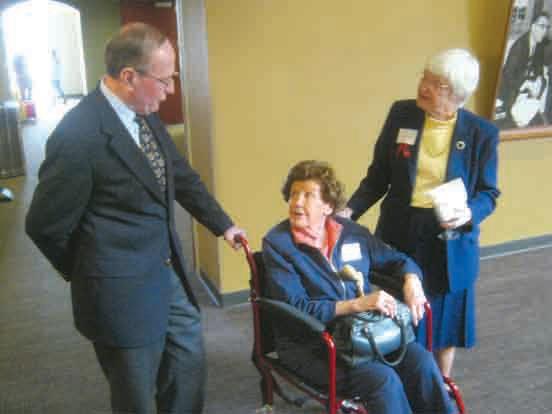
13 minute read
News
from Feb. 21, 2013
Tax news
In a Reno Chamber of Commerce newsletter, chamber lobbyist Tray Abney seemed to indicate conditioned acceptance of a service tax:
Advertisement
“There is a lot of talk about looking at a sales tax on services this session, and [Clark County Sen.] Michael Roberson stated to [reporter Jon] Ralston that construction defect reform is very important to him. Do we have the makings of a deal? A services tax in exchange for reforms such as construction defect?”
Rhee II
Former Washington, D.C., schools chancellor Michelle Rhee’s political organization, StudentsFirst, contacted us after our item appeared on the PBS Frontline investigation of Rhee’s tenure as chancellor (“Rhee record probed,” Feb. 7).
A spokesperson of the group wrote that “in addition to the DC inspector general investigation you mentioned, there have been three additional analyses finding no evidence of widespread cheating. Those studies were conducted by the U.S. Department of Education, Caveon Test Security, and Alvarez & Marsal.”
The DOE probe found no evidence of widespread cheating in Washington, D.C., public schools. “Our investigation was unable to substantiate the allegations that false claims were made to [DOE] for payment of funds, and the U.S. Department of Justice declined to intervene,” the department said in a prepared statement.
The report on that investigation was released Jan. 7. That was the day before the Frontline program was broadcast, though the DOE results were posted on the PBS website.
The Caveon report supported Rhee as far as it went— “Caveon did not find evidence of cheating at any of the schools”—but Rhee herself questioned the breadth of its probe: “We just hired them to do the investigation and really believed that they were going to do it in as comprehensive a manner as possible.”
We were unable to obtain a copy of the Alvarez & Marsal report. The company’s website has no reference to it. But one online site reported that the company’s report “found cheating in fewer than 0.0006 percent of [D.C.] classrooms.”
However, it was easier to find criticism of Alvarez & Marsal’s involvement in the D.C. matter. The company aids troubled businesses, and education analyst Diane Ravitch wrote, “Alvarez & Marsal has no experience in investigating cheating scandals.” At another point, she wrote about the company’s direct involvement in running a school district: “Alvarez & Marsal [was] previously known for its work in St. Louis, where they ran the district like a business for one year, collected $5 million, and left, shortly before the state declared the district to be in such bad shape that the state took control.”
Test scores rose in D.C. when Rhee was chancellor, but there were still the lowest graduation rates in the country and among the widest achievement gaps.
Rhee’s political organization ran a television campaign in Nevada in 2011 to influence schools bills before the Legislature.
Nevada farming gains
It’s often forgotten that Nevada is a farming state, though not a big one.
The Nevada Agriculture Department has released figures showing that the state broke the $100 million mark for the first time. A department statement said, “2012 ended with total agriculture and food exports of $114.34 million. This is a year to year increase of 11.8 percent from 2011. According to the U.S. Department of Commerce, for every $181,000 in export sales, one job that pays 17 percent better than a job not associated with exporting is created. That means that 631 high end jobs have been created in the Nevada agriculture and food industries due to increased export sales.”
—Dennis Myers
Richard Bryan greets his one-time election opponent Patty Cafferata, standing right, and her mother, Barbara Vucanovich, at the UNR library.
Meeting in the middle
A gathering of those who used to govern is a reminder of today’s poisonous politics
“There’s Kelly Peccole,” Richard Bryan exclaimed as he caught sight of a by member of an old Reno family. Dennis Myers The former Nevada state legislator, state senator, attorney general, governor and U.S. senator had not lost his touch for remembering names and faces and places, even 12 years after he left politics and in areas distant from his hometown of Las Vegas. In remarks he made later, he referenced “Bruno Selmi’s Country Club” in Gerlach, a fixture of rural Nevada for six decades.
Patty Cafferata Former state legislator
Bryan was in Reno for a ceremony at which he signed off his private papers to Special Collections and University Archives at the University of Nevada, Reno library, and numerous people were on hand from his time in politics. Significantly, they included both his fellow Democrats and Republicans. In fact, his 1986 Republican reelection opponent in the governor’s race, Patty Cafferata, was in attendance.
Back then, that second sentence did not interfere with the first sentence. As state treasurer, Cafferata sat with Bryan on the Nevada Board of Finance, and they worked fine together. It was a very different time.
Someone observed to Bryan that Congress has changed from when he was a U.S. Senator. “Oh, my gosh, yes,” he responded. “And change that I don’t think is in the best interests of the country.”
Bryan’s time in Congress was a transitional period in that institution. When he began serving on Jan. 3, 1989, there was still some of the collegiality in which Republicans and Democrats worked together. By the time he retired 12 years later, on Jan. 3, 2001, members could be branded as disloyal to the party if they were seen having lunch with members of the opposite party.
Bryan: “I was privileged to serve in a time when people had strong disagreements but were still able to reach an agreement and in which there were relationships outside of the partisan realm in which, after the day was over, people could visit socially, get together for family gatherings and find interests that they had in common, whether it was history or sports or whatever it was, and that seems to have been left aside.”
Also in attendance at Special Collections for Bryan’s ceremony was Cafferata’s mother, Barbara Vucanovich, a Republican and the state’s first woman U.S. House member, serving from 1983 to 1997. She said she would not want to go back to Washington, D.C., today.
Even her daughter, who in her time was thought of as pretty partisan, is taken aback by what politics has become. Cafferata ran for the U.S. House in 1996, but has no interest in doing so again.
Although politics was considered shallow back then, today it seems like an Algonquin Round Table by comparison.
Even the Nevada Legislature has slid into the hyper-partisanship that afflicts Congress.
For Bryan, who began serving in the legislature in 1969, the difference is even greater. He remembers a mutually respectful relationship among legislators of different parties and regions.
“Oh, yes, it was [collegial],” he said. “In fact, I’ve often said coming up from Las Vegas as a Democrat, newly elected Democrat who’d been public defender, the people that I formed a bond with immediately were our counterparts in Washoe County, Republican legislators. And I served with a number of them on the Assembly Judiciary Committee. Roy Torvinen was the chairman. He’d been the [Reno] city attorney. Wonderful fellow. Bart Shouweiler, later became the U.S. Attorney,
he was on that committee. And Harry Reid and I were kind of the newcomers from the south. I don’t recall much, if any, partisanship. There may been one or two issues. But, no. A different time.”
It was the Republican speaker of the Assembly, Howard McKissick, who gave the two first termers who worked closely together, Reid and Bryan, the nickname that stayed with them over the years—the gold dust twins. Everyone seemed to know they were going places.
Contrast that bipartisan environment with the 2003 Nevada Legislature, where Republican assemblymembers spent much of the session cloistered in their upstairs leadership offices in incessant closed caucuses, limiting contact with Democrats, strategizing on how to use their minority numbers to gridlock the process until they got their way—defeat of Republican Gov. Kenny Guinn’s business taxes. Three members of the GOP caucus who disagreed with these tactics were stigmatized and stopped meeting with their own caucus.
It’s not only the Republicans who went that way. Also in attendance at the Bryan ceremony at Special Collections was Thomas “Spike” Wilson, a Democratic state senator from 1970 to 1986. When he went back to the Legislature years later, he discovered that Democrats frequently interrupted legislative business to caucus and determine party policy.
“I don’t think we ever had a caucus when I was there,” he said after that visit.
Another factor in the culture of today’s politics is journalism that’s not very politically savvy and also seems to foster the poison. One member of a panel discussion that followed the Bryan ceremony at the UNR library was former state legislator and lieutenant governor Sue Wagner, a Republican. In January 1996 she announced that because Capitol Hill politics had become so extreme and uncivilized, she would not run for the U.S. House, a campaign she had long intended to run. The Reno Gazette-Journal responded with an editorial suggesting that she was a coward: “[T]he moderates slink off the stage without even putting up a fight.” If anything, it reinforced Wagner’s point (and prompted a flood of angry letters to the editor). Ω
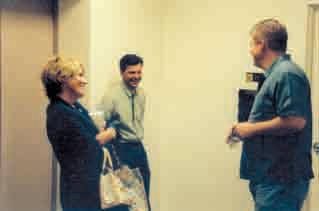
PHOTO/DENNIS MYERS
At the 2003 Nevada Legislature, the three Gs—Dawn Gibbons, Jason Geddes and Josh Griffin—were made unwelcome in their own GOP caucus because they would not vote the party line.

Thursday, Feb. 28, 2013 | 7:30 p.m. | Nightingale Concert Hall
Charting what National Geographic calls “a new sonic frontier with deep ties to tradition,” internationally acclaimed Hawai’ian slack key guitarist/ singer/composer Makana is considered the youngest authority on his centuries-old art form and according to Esquire Magazine, “its greatest living player.” Makana is renowned among a diverse fan base, from his island neighbors to fellow guitar greats — Joe Satriani, Elliot Easton and Kirk Hammett have all praised his work — and recently, the White House. Tickets: Adult $24/ Senior $20/ Student and youth $12
(775) 784-4ART | Buy tickets online at www.unr.edu/pas
Hanging Out


presents
italian americans
Italian Americans have become some of the most celebrated players in baseball — DiMaggio, Berra, Rizzuto, Lasorda, LaRussa, Zito. ’s documentary exhibition honors their contributions and those of 450 others who have left a lasting imprint on the game.
A new car dealership opened in Sparks last weekend, and the vehicle overflow from the sale was accommodated, sort of, across the street.
From Sand Lots to the Major Leagues January 17–May 19, 2013
12 to 5 PM Thursday through Sunday FREE ADMISSION 442 Flint Street, Reno arteitaliausa.com
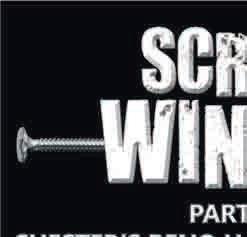
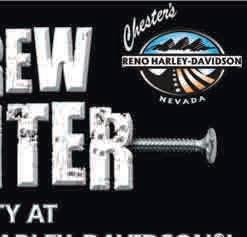
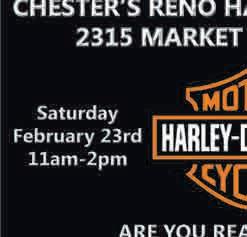
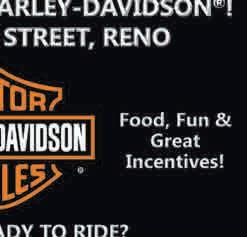


reinvent yourself

Letter of intent
Last week, 21 members of Congress submitted a letter to Department of Interior Secretary Ken Salazar expressing concerns over the methods of and money spent on wild horse roundups throughout several Western states. The letter, which can be read at www.tinyurl.com/c19sdua, was organized by Raul M. Grijalva, D-Ariz., and Ed Whitefield, R-Ky., who have requested a response from Salazar in 10 days. In November, the American Wild Horse Preservation Campaign sent a petition with more than 25,000 signatures to the DOI but received no response.
“This issue is especially timely because evidence of abusive treatment of mustangs in federal roundups continues to emerge, recently prompting a federal court judge in Nevada to place restrictions on [Bureau of Land Management] staff with regard to handling practices that include routine electroshocking of captured horses,” the letter states. “The BLM must be more forthcoming with its proposals to modernize the wild horse and burro program. It must also develop a long-term strategy that reflects balanced interests of America’s wild horses and burros and the unique legacy of our public lands. We believe the agenda for this conversation should include: The effectiveness of roundups as the primary method of managing wild horse and burro populations on public lands— especially when looked at in conjunction with the long-term sustainability and cost of this program; evidence of cruel treatment of wild horses during and after roundups; [and] humane and cost-effective options for on-the-range management of wild horses as an alternative to roundups and removals.”
The letter also references a ProPublica report published last fall, which highlighted claims that wild horses were being sold to slaughter or living in unsavory conditions after roundups.
Baker’s bill
A new cottage industry bill has been proposed by Sen. Aaron Ford that would allow for home cooks, bakers and farmers to sell products without becoming a commercial kitchen. The bill, referred to as the Baker’s Bill, would permit home cooks to sell baked goods and dried teas. The Baker’s Bill will be sponsored by Ford in this year’s legislative session.
“A cottage industry law would allow opportunities for community-based food production in which small business entrepreneurs could test out their best ideas for artisan or locally-based food,” said Quest Lakes, task force facilitator for the Healthy Communities Coalition. “In other words, people can formalize and grow their businesses with minimal start-up investment. … Cottage industries can also expand the healthy local food available to rural customers who may be far from large grocery stores.”
Neighboring states, including California, have cottage industry laws that allow for “non-potentially hazardous foods,” according to the Sustainable Economics Law Center. These foods are “unlikely to grow harmful bacteria or other toxic microorganisms at room temperature,” including dried fruit, dried pasta, herb blends, candy, and baked goods without fruit or meat filling. Some items, like jams and preserves, are also permitted but must abide by local regulations.
—Ashley Hennefer
ashleyh@newsreview.com
TAKE ADVANTAGE OF:

- Convenient Class Schedules - Limitless Career Opportunities - Learn from the Experts - Get into the Workforce Sooner

HAIR • SKIN • NAILS
NOW enrolling 855.598.4016

Financial Aid available to those who qualify

Accredited by NACCAS | Programs vary by location Career Placement assistance for graduates For Gainful Employment disclosures, visit www.marinello.com/disclosure
RENO 5093 S. McCarran Blvd.
marinello.com
Defining Beauty Education Since 1905
ECO-EVENT
Learn how to determine greenwashing— claims that products are environmentally-friendly or sustainable— at a lecture at the Reynolds School of Journalism. Kim Sheehan, professor at the University of Oregon and co-founder of the Greenwashing Index, will talk about how businesses and governments can handle greenwashing. March 5, 4 p.m., Linn Reading Room, Reynolds School of Journalism, University of Nevada, Reno campus. For more information, visit http://environment.unr.edu.
Got an eco-event? Contact ashleyh@newsreview.com. Visit www.facebook.com/RNRGreen for more.











